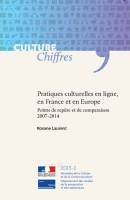Roxane LAURENT
october 2015
24 p.
As of 2007, the annual Europe-wide household survey on information and communication technologies has been providing an insight into internet users’ access rates and digital usage patterns. in 2014, more than eight out of ten households in Europe and France had access to the internet, although broadband access rates were slightly lower (77% of households in France), with a marked divide between the far more highly-equipped northern countries, and the southern and eastern European countries, which were far less so.
The last survey into digital cultural practices carried out in 2014 covered, on the one hand, online press reading, and on the other, watching and downloading films, music and video games, as well as online radio listening. Less than 50% of internet users in France are involved in these practices, putting the country’s rates below the European average. Those living in northern Europe generally use the internet to read the press, watch films, listen to music, play videogames or even listen to the radio, whilst such participation rates in southern and eastern European countries are far lower. Although the younger generations remain far more invested in digital cultural practices, the survey indicates increasing levels of such usage among internet users aged between 55 and 64, particularly in France.
Less than half of French people (47%) have watched, listened, played online or downloaded films, music, images or games, as compared with the European average of 49%; 34% of French internet users listen to the radio online, and 46% read the online press, putting France towards the bottom of the European league table. in France, just as in Europe, less than the one in four users go online to purchase cultural goods: 15% of French internet users purchased films or music online in 2014, 21% bought tickets for cultural or leisure events and 24% bought books, magazines or educational material. Finally, the storage and sharing of cultural content via cloud systems remains a minority practice, concerning only one third of internet users.


